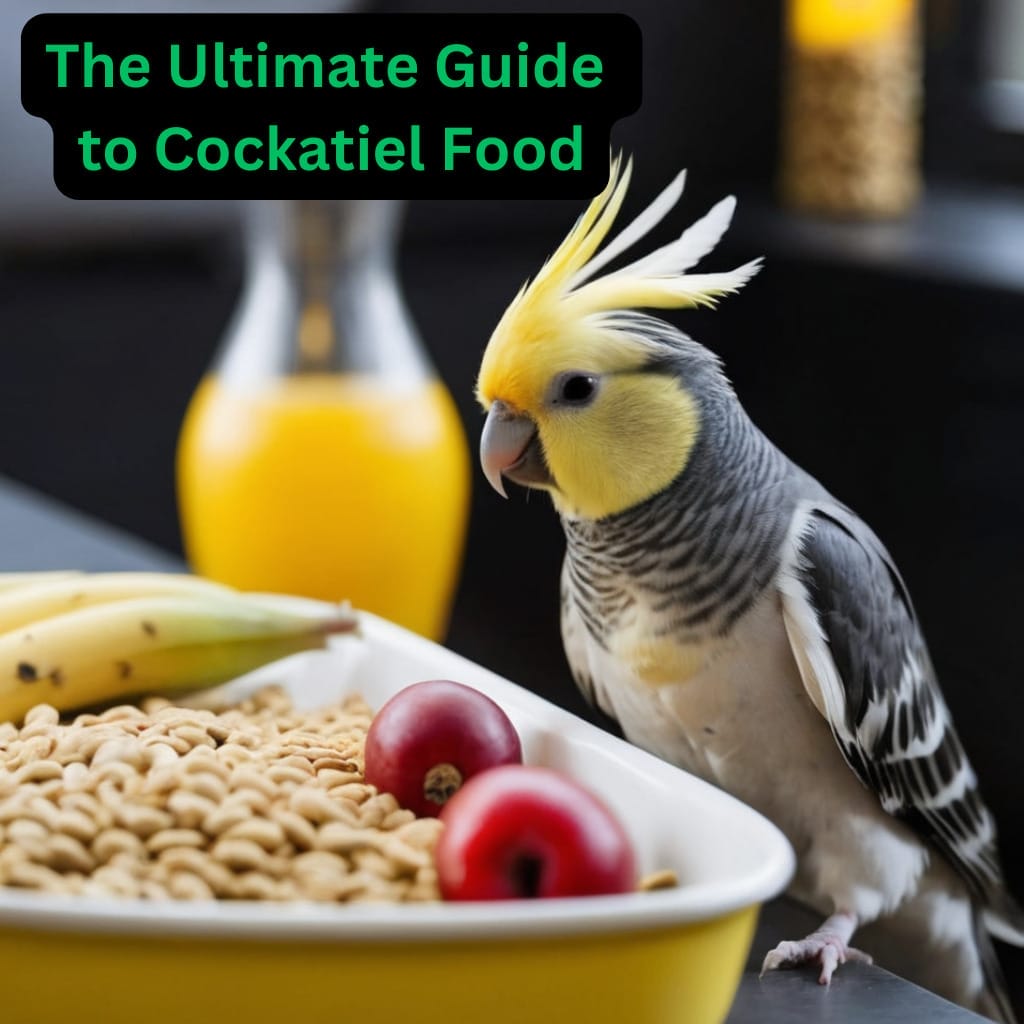Understanding a Cockatiel’s Dietary Needs

The Importance of Balanced Nutrition for Cockatiels
Just like the star athletes we so look up to, your feathery companions also need a balanced diet to maintain peak performance, or should I say, peak squawking! Providing your lively cockatiel with a balanced diet is as important as giving your car top-quality gasoline. It’s not just about fueling them up; it’s about doing it right.
Thrive they may on seeds (they’re not called seed-eaters just for kicks), but these birds aren’t exactly designed to live on seeds alone. A diet solely or mainly composed of seeds can lead to obesity and malnutrition, both serious no-no’s in the bird world. Just like us, variety adds spice to their life, and, in this case, it sways them away from health issues too.
Key Nutrients Required by Cockatiels
Think of your bird’s food as an orchestra, each constituent playing a unique and indispensable part in ensuring their health remains “note-perfect”. Carbohydrates (high five to energy!), proteins (building blocks, ahoy!), fat (not too much, please), and those sneaky little vitamins and minerals—these are the nutrients your cockatiel needs.
This might seem like a daunting task, akin to winning a wrestling match with kangaroos, but that’s what you and I are here for. Together, we’ll figure it out without breaking an egg!
Gauging the Daily Dietary Intake for Cockatiel
Just as a cup of joe doesn’t fit all when it comes to humans, birds too have individual diets based on factors like age, size, and activity levels. Consider your bird’s dietary intake as a meticulous event planner – ensuring a right balance of fun (calories) and order (nutrients)!
The talkative nature and high activity levels of a cockatiel mean they need copious energy. A general guideline is approximately one and a half to two tablespoons of a well-balanced, cockatiel-specific mix daily. Remember, these are not hard rules, and you should adjust according to the needs of your individual bird.
Diverse Sources of Cockatiel Food

Commercial Bird Food: Availability and Variety
Grocery store, pet store, or digital platform? Choices, choices! Reading the labels (yes, the small print too) can help you make the best decision for your feathery friend. There are pellets, seed mixes, nutritional supplement bars, and so on. But before you buy a party-size bag of birdie chow, do some research on reputable brands. It’s much like picking a fine wine, but for birds!
Fresh Fruits and Vegetables: Ideal Choices and Portion Control
Watch out Jamie Oliver, here come the bird owners! Fresh fruits and vegetables are the superstars of a cockatiel’s diet, bringing a riot of flavors, colors, and essential nutrients to the table. Imagine tropical fruits, crunchy veggies, and dark, leafy greens in your bird’s menu, and you’re right on track.
What Can Fruits Cockatiels Eat List:
What Can Vegetable Cockatiels Eat List:
But remember, it’s not all buffet-style. Too much of a good thing can cause upset tummies and weight gain. Keep fruit portions small (about 10% of the diet), and opt for veggies most of the time. Be more Popeye and less Johnny Appleseed! For a delightful twist, consider adding cockatiel-friendly fruits like papaya, melon, Cherries and berries to your feathered friend’s culinary adventure.
Seeds, Nuts, and Grains for Healthy Cockatiel Feeding
Seeds and grains should be more of a side dish than a main course, and nuts? Think of them as the dessert. Include a variety of each, sunflower seeds, millets, quinoa, almonds, walnuts—the whole gang. Remember, balance in all things (even this nutty, seedy business) is the key.
Safe and Unsafe Foods for Cockatiels

MUST-KNOW: Unsafe Foods that Pose Potential Health Risks
If the food world was an adventure action movie, there’d be allies (safe foods) and enemies (harmful ones). Foods like avocados, onions, chocolate, and coffee need to be kept far from your feathered friend—they’re more foe than friend. Yes, you read right. Contrary to what a wily bird might tell you, these villains can cause serious health problems.
Curious about adding chicken to your cockatiel’s menu? Explore our article on “Can Cockatiels Eat Chicken?” to learn about suitable proteins for your feathered companion.
Intrinsic Nutritional Constituents in Safe Foods
Safe foods for your feathered pet are, thankfully, less complicated. They contain vitamins, minerals, and nutrients that are central to your bird’s health with nothing sneaky hiding inside. However, it’s important to remember to wash them thoroughly to remove any residual pesticides, just in case they’re staging an undercover mission!
Identifying Signs of Food Allergies or Intolerance in Cockatiel
Food allergies in cockatiels might sound like a science fiction sequel to Hitchcock’s “The Birds,” but it’s a real thing. Keep a sharp eye (use your bird-watching binoculars, if need be) for symptoms like vomiting, weight loss, ruffled feathers, and changes in feces. If you suspect any dietary mischief, seek veterinary advice pronto.
Feeding Techniques and Schedule

Age-appropriate Feeding Guidelines for Cockatiel Food
It won’t surprise me if you’ve been tempted to use baby talk with your cockatiel—they’re just so darn cute! But remember, young cockatiels and adults have different nutrition requirements. While chicks need more protein for growth, adults fare better on a diet rich in vitamins, minerals, and carbs. Think of it as feeding a growing teenager versus a settled adult—a world of difference.
Meal Portioning: How Much is Too Much?
The question eternally bothering mankind and bird-kind alike—how much is too much? Teeny-weeny as they may be, Cockatiels can eat up to 30-40% of their body weight in a day. Serve the food in a clean, shallow dish so that their feast doesn’t turn into a scavenger hunt.
For seeds and nuts, maintain portion control. Much like ‘saving room for dessert’ during a family feast, these should be enjoyed but in moderation.
Training Your Cockatiel to Have a Diverse Diet
Getting your cockatiel to try new foods can sometimes feel like getting a child to eat spinach—quite the Herculean feat. Introducing new foods slowly, offering a healthy mix at feeding time, and being patient (no evil-eye, please!) can help your birds accept a diverse diet.
Remember, slow and steady wins the race. Except in this case, it wins the best-fed bird award!
Tips for Transitioning Your Cockatiel to a new diet
Gradual Approach to Diet Transition
Morphing your bird’s diet isn’t a superhero-flick feat. A gradual, step-by-step approach ensures they accept new foods without shocks or health issues. Much like acing a dance routine, one step at a time will lead you to a starry finale!
Overcoming Common Struggles While Transitioning Your Cockatiel’s Diet
Is your bird acting all picky—dancing around new foods? Stay calm! Try different approaches like hand-feeding, introducing one food at a time, or making food a part of playtime. Innovate, experiment, and remember – patience rivals gold in value!
Effectively Monitoring the Health of Your Cockatiel During Transition
Always keep a keen eye on your bird’s health during the diet transition. Like a silent intruder, weight changes, behavior shifts, and poop alterations could signal trouble. Notice something fishy? Seek assistance from a vet immediately.
Summary: Keys to a Healthy Cockatiel Diet
The balanced diet mystery isn’t as perplexing as the Bermuda triangle. In fact, it’s quite simple when you get the hang of it. Fresh fruits and veggies, a dash of seeds, nuts, and grains, along with some rock-star commercial food mixes can do the trick. Keep harmful foods at bay, understand your bird’s needs, stay vigilant for any signs of trouble, and above all, dance to the rhythm of patience.
Remember, your feathered buddy is counting on you!
